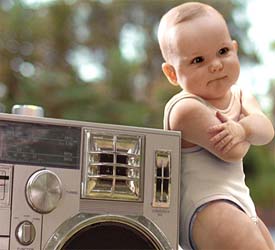Some babies may be more interested to dance than to talk
 British and Finnish researchers have found that the more babies danced to music, the more they smiled.
British and Finnish researchers have found that the more babies danced to music, the more they smiled.
It was concluded by study leader Marcel Zenter of the University of York in England and Tuomas Eerola of the University of Jyvaskyla, Finland, that babies may be born with a predisposition to move in response to rhythm and tempo and find it more engaging than speech.
Zenter said in a statement, "Our research suggests that it is the beat rather than other features of the music, such as the melody, that produces the response in infants. We also found that the better the children were able to synchronize their movements with the music the more they smiled."
Zenter, Eerola and colleagues had infants age five months to 2 years listen to a variety of audio stimuli including classical music, rhythmic beats and speech. The children's spontaneous movements were recorded and compared across the different stimuli. Professional dancers also analyzed the extent the babies matched their movement to the music. (With Inputs from Agencies)